What Is a Scopist: Jobs & Salary
Unless you’re a diehard fan of Law & Order, you probably haven’t heard of a scopist before.
Scoping is a niche profession that involves editing transcripts produced by court reporters. Understanding what a scopist does can feel as difficult as solving a crime scene if you’re investigating this career for the first time.
Luckily though, our detectives are on the case. If you’re looking for a career in the legal field that offers flexibility to work from anywhere, doesn’t require a degree, and promises a lucrative salary, then scoping could be right up your alley.
In this article, we explain exactly what a scopist is and what skills are involved.
What does a scopist do?
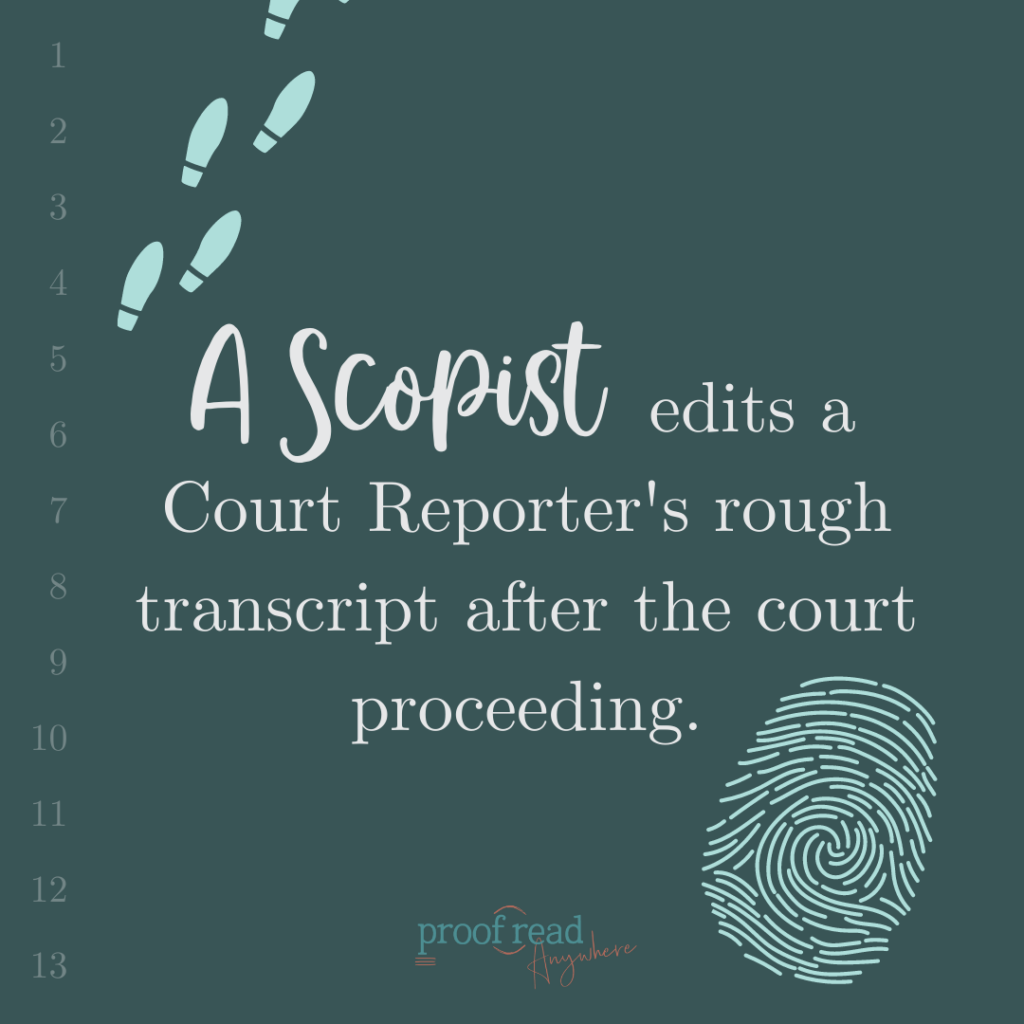
A professional scopist turns a court reporter’s rough transcripts into polished works that accurately capture each speaker’s words in court. This involves checking for spelling mistakes, fixing translation errors, and formatting transcripts according to the court reporter’s preferred style.
Scopists must also ensure any changes they do make are appropriate for the context. For example, a scopist may need to strategically ignore typical punctuation rules if following the rules would change a phrase’s tone or meaning. These professionals are expected to listen to court audio files, as well as read the rough transcripts, to ensure the scoping edits perfectly capture the court proceedings.
Is scoping different from court reporting?
While scopists and court reporters both work on legal transcripts, the two professions concern very different roles: court reporters record and transcribe live legal proceedings using shorthand methods and stenotype machines, then scopists assist court reporters by cleaning up their rough transcripts.
Scopists don’t require as much expertise and industry knowledge as court reporters. Rather than work in the courtroom at the time of the hearing, scopists receive transcripts electronically and work remotely, typically as freelancers.
Can I work from home as a scopist?
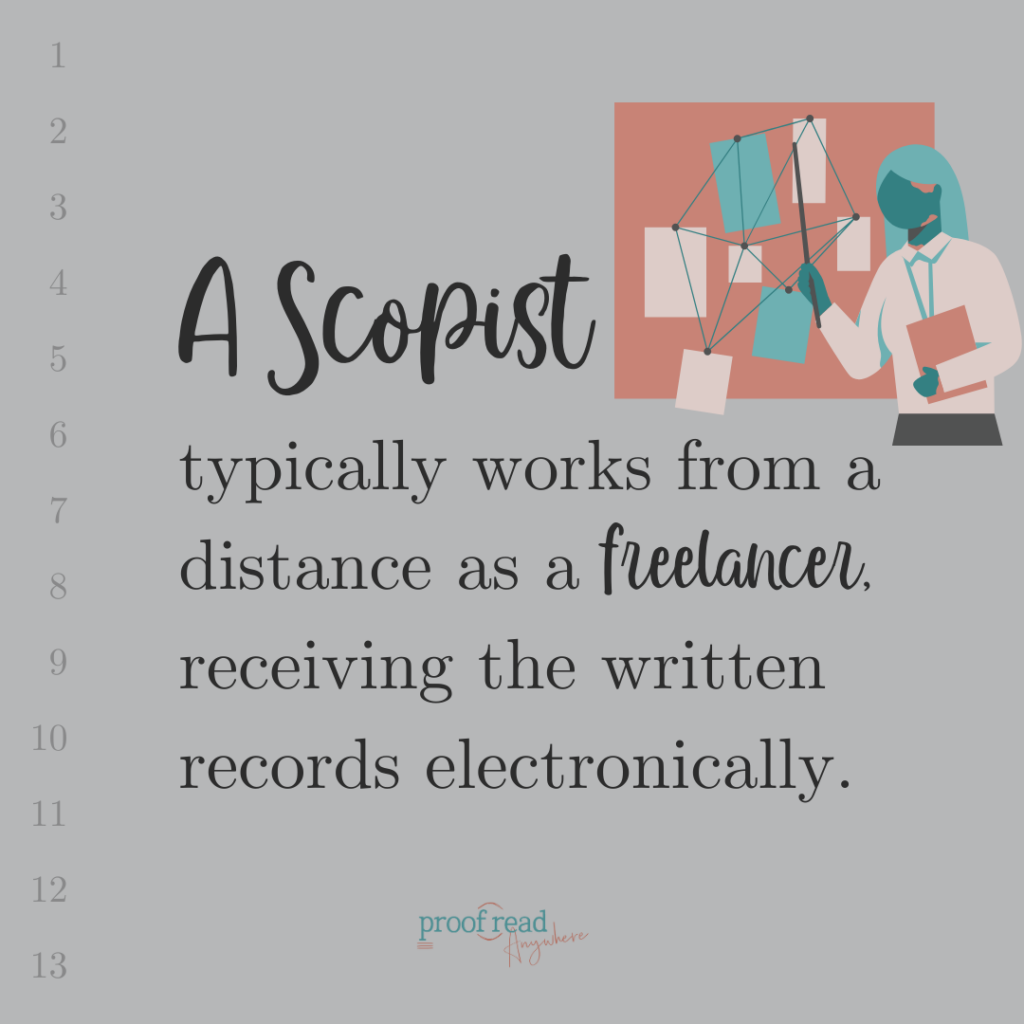
Yep! Scoping is one of the few legal jobs where you can work from home or from anywhere else. In fact, virtually all scopists are self-employed and work remotely, which makes scoping a fantastic career for those after more flexibility in their day-to-day lives.
How to Become a Scopist
You don’t need to have a legal background to become a successful scopist, nor do you need to have a brain rivaling that of Sherlock Holmes. All the skills required to excel (and grow) as a scopist are accessible, easy to learn, and rewarding to master.
In fact, many of the skills for this job will come naturally to you if you’re already a freelancer working in the proofreading or editing industry.
What skills do I need to be a scopist?
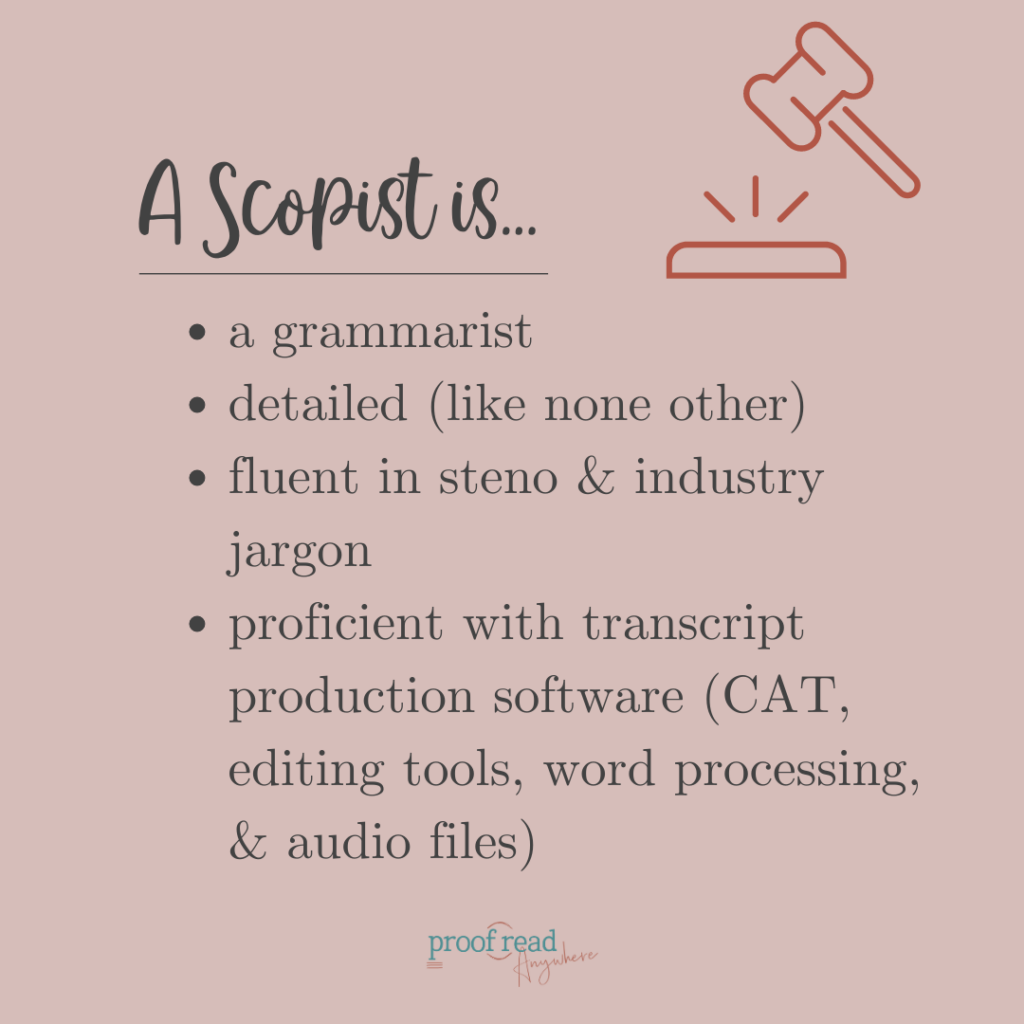
Scopists must have an extensive vocabulary, excellent research skills, and an eye for spotting grammar, spelling, and punctuation errors — just like traditional freelance editors. And, as any freelancer knows, the ability to work independently and meet tight turnarounds is key.
Additionally, scopists must be familiar with transcript formatting, computer-aided transcription software (CAT), and steno shorthand. These transcript editors also need to have strong listening skills and an understanding of industry terms.
While a lot of these skills sound difficult to master, most students build proficiency quickly and easily with training. There are many training courses available online that offer easily digestible courses.
Grammar Skills
Polishing up transcripts doesn’t just mean fixing obvious spelling mistakes or translation errors. This type of editing also involves correcting grammar to ensure sentences are coherent and accurately reflect each speaker’s tone of voice.
In some instances, scopists are also expected to break grammar rules if doing so will better capture the speaker’s emotions. For example, some court reporters prefer scopists to keep pauses, hesitations, and repeated words rather than “cleaning up” the transcript. This is certainly one skill that, to pull off successfully, requires a strong understanding of grammar fundamentals.
But if your grammar is a little rusty, don’t sweat it. Grammar Lion has a super useful grammar refresher course to polish your knowledge of the basics, such as run-on sentences and misused homophones (our biggest grammar pet peeve!).
Attention to Detail
Scopists are essentially the detectives of the written realm; they hunt for inconsistencies, spot even the smallest of mistakes, and catch mistranslation errors.
Understandably, these skills all require high attention to detail — which can, of course, be honed with practice. However, other ways to improve include limiting distractions, staying organized, and taking regular breaks to maintain a sharp focus. You should also keep multitasking to a minimum while scoping.
Familiarity with Industry Terminology
As a freelance scopist, you don’t need to be skilled in the ins and outs of stenography. Court reporters use stenotype machines to record and transcribe live legal proceedings in shorthand, which is then automatically translated into full, legible sentences. Scopists, however, rely on their knowledge of shorthand theories to guide them in fixing the few untranslated steno notes and spotting mistakes in the automatic translation.
Scopists are also familiar with legal, medical, and technical terminology in order to understand and edit transcripts accurately.
Technology Skills
Scopists don’t have to be super tech-savvy, but they do need to be comfortable with transcript production software such as CAT, editing tools, and word processing software. Scopists should also know how to manage audio files and transfer data in various formats, depending on the court reporter’s preference.
Other Skills
Among the technical and knowledge-based skills required by professional scopists, soft skills such as project and time management are also a must to be successful in this career. Scopists must be able to work under pressure, meet tight deadlines, and prioritize tasks effectively.
These professionals should also compose themselves in a professional manner, have strong communication skills, and maintain strict confidentiality of personal details involved in their work (you may have to rethink your go-to remote work spot if it’s currently a busy cafe!).
Scopist Salary and Pay
There’s no question about it — scopists can earn a lucrative living. Beginner scopists typically earn $32,254 per year, whereas well-trained scopists hit up to $53,085 annually (or in some cases even more).
Your exact earning potential will depend on factors such as where you live, job demand, and your level of expertise. Efficiency can play a role too; scopists typically charge by the page ($1 to $1.50 per page on average), meaning the faster they work, the better their income.
How much money can I make as a scopist?
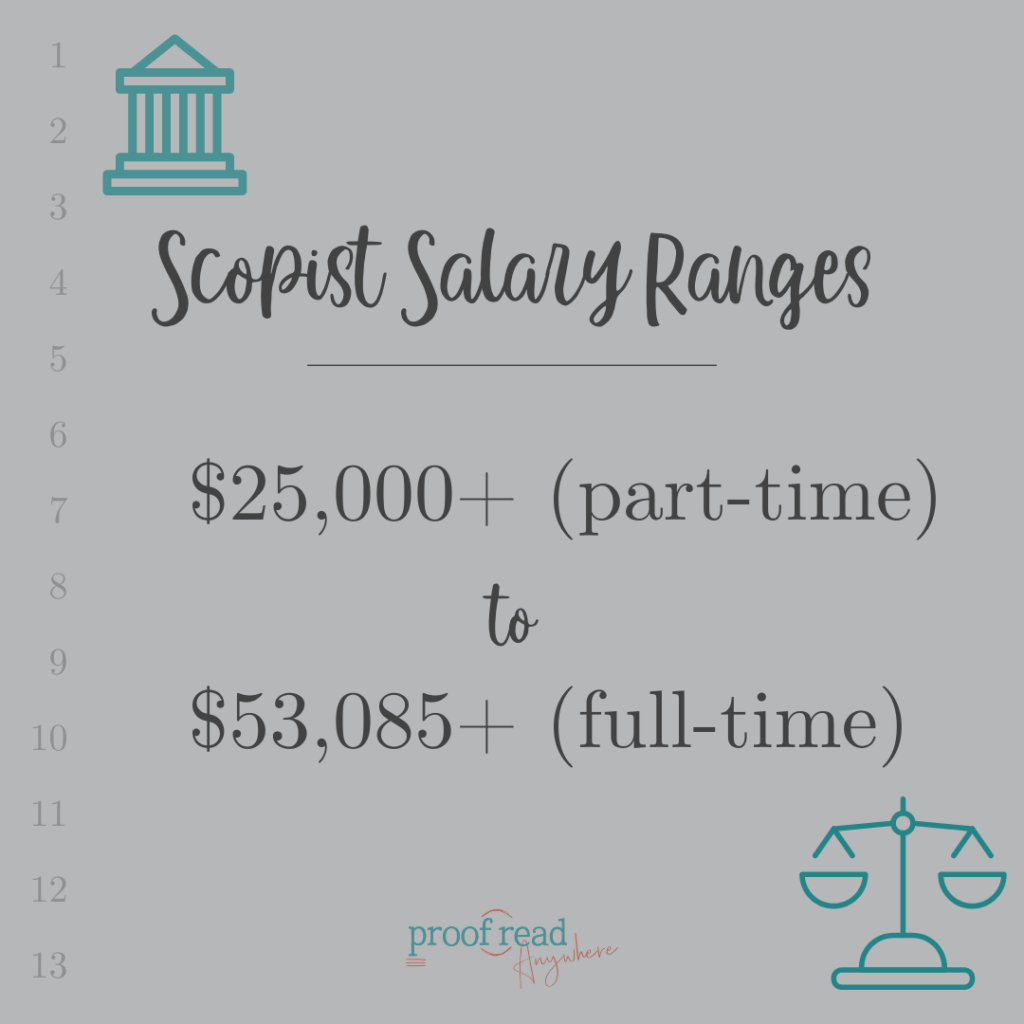
On average, you can make between $32,254 and $53,085 as a full-time scopist, or around $25,000 on a part-time basis (working 25 hours a week at a rate of $20 per hour). These are some impressive numbers, especially if you’re making the transition from general proofreading to scopist work.
Scopist Training & Scopist Courses
Unlike most legal roles, you don’t need a degree to become a successful scopist. While scoping does require some training, you shouldn’t feel out of your depth; the skills needed to succeed as a scopist are fairly easy to pick up, as long as you’re willing to put in the time and effort.
Do I need formal scoping training?
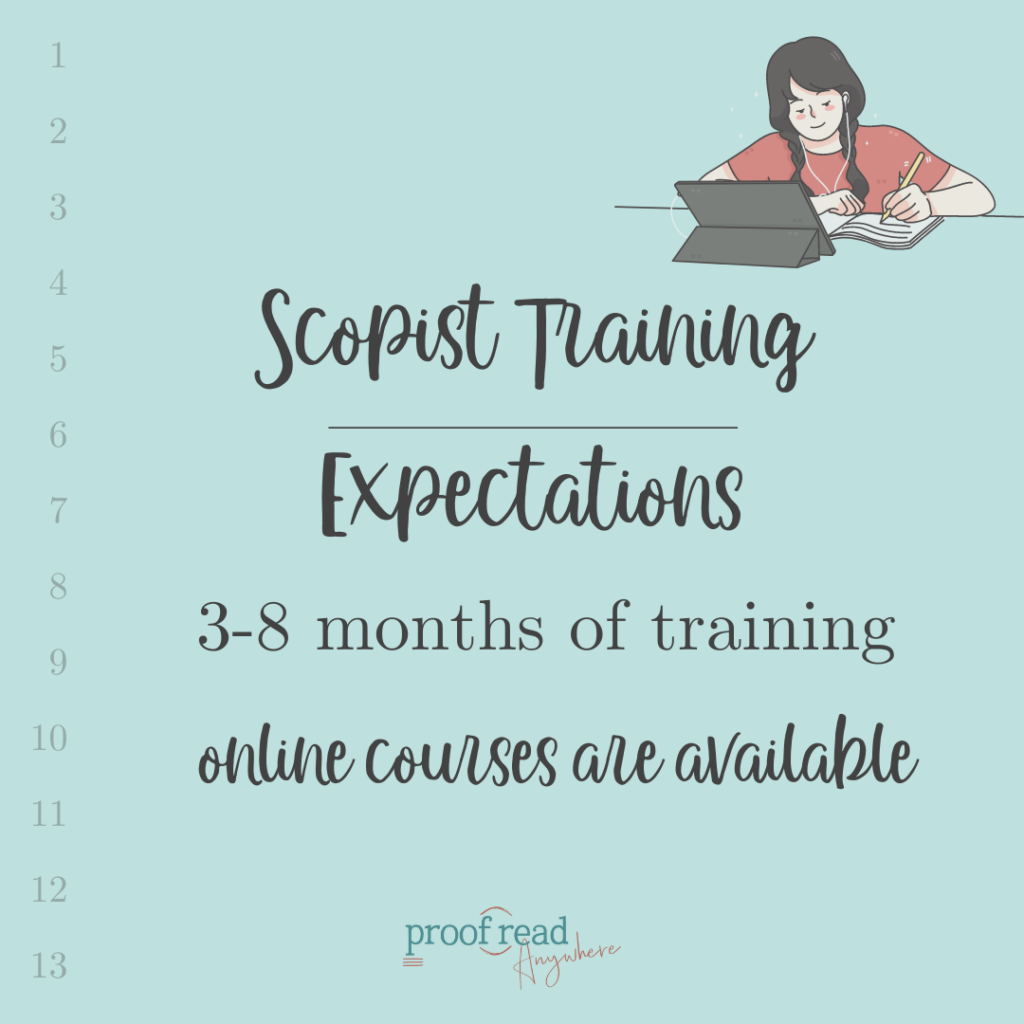
Editing and formatting court transcripts properly requires specific skills and knowledge in using CAT software, note-reading, and transcript production, as well as industry knowledge about commonly made mistakes in court transcripts and the ethics behind it all.
Luckily, learning the ropes isn’t a multi-year-long endeavor — most scoping training programs only take three to eight months to complete, and the courses are made for any level of legal knowledge and tech expertise.
Scope School has an absolutely amazing online scopist training program, which we’ll cover in more detail below.
How can I learn the ropes?
Learning a whole new set of skills can be overwhelming, especially when you factor in a lack of time, other life commitments, and a limited budget.
But don’t give up on your dream of becoming a scopist just yet — Scope School offers a comprehensive training program that allows you to work at your own pace, making it super easy to juggle the training and the million other things on your plate.
This training is also an incredibly affordable investment, costing 80% to 90% less than a typical college degree but fetching you the same high earning potential.
Why We Love Scope School

Scope School offers a flexible, inclusive, user-friendly learning experience that we feel is one of the most comprehensive online scoping programs out there. It’s broken into several, in-depth units that cover absolutely everything you need to know about scoping, from formatting transcripts to fundamental grammar rules.
And while many courses only hone scoping skills, Scope School teaches you how to make use of your newfound skills. The program also includes several business training modules that cover how to advertise your services, build a strong brand identity, and attract potential clients.
As a student, you’ll be guided every step of the way and given lifetime access to exclusive Scope School community groups where members support one another throughout their scopist career journeys.
Scopist Equipment & Tech
As a freelance scopist, you do need to fork out money for some equipment to ensure you can perform your tasks efficiently and effectively. But don’t let that put you off a scopist career! The cost of required equipment and software are self-employment business expenses that are tax deductible.
Some costs to expect as you begin working as a scopist include CAT software, a high-quality headphone set, and office equipment such as a responsive computer, keyboard, and ergonomic chair. Professionals also recommend investing in a USB foot pedal to make it easier to hear and interact with audio recordings.
How do I build my scoping business?

You can build your scoping business by honing both your practical scoping skills and marketing skills.
Here’s where we recommend you begin:
- Enroll in an online training program: Training online is the best way to hone your scoping skills and receive a well-rounded education. If you’re not sure whether you want to specialize as a scopist just yet, you can begin with Transcribe Anywhere’s general transcription course. It will teach you all the fundamentals and better prepare you for a scopist role in the future if you do choose to specialize later on.
- Become the ultimate wordsmith: Refresh your grammar knowledge, expand your vocabulary, and familiarize yourself with different formatting guidelines.
- Connect with other scopists for advice: Experienced scopists have a lot of knowledge to offer and in most cases are more than happy to share a few trade secrets or tips. After all, they know what it’s like to be in your shoes!
And once you’re off to a solid start, take some extra steps to hone your marketing skills:
- Participate in online digital marketing courses: You can find plenty of online courses on e-learning platforms like FutureLearn, and Coursera.
- Set up a business website from scratch: Creating a business website from scratch isn’t as difficult as it seems. Our article will guide you through every step of the way! Once you’ve set up your website, you’ll have a whole new platform to establish your brand identity, connect to potential clients, and advertise your services.
- Try out your brand identity across social media platforms: Over time, you’ll see what types of content receive the most engagement.
We understand that a lot of this can seem daunting, especially the marketing side of things if you’re new to freelancing in general! But we’re confident that with Scope School’s step-by-step training program, you’ll find all the tools, knowledge, and support you need to succeed as a scopist.
Our Final Thoughts
Becoming a scopist can be a rewarding, fulfilling career for those with a knack for grammar and an interest in legal processes. While scoping does require some training, it comes with the payoff of a high earning potential and flexible career that allows you to work from home. Plus, you don’t need any previous experience or a degree to succeed—just a positive mindset and willingness to learn.
If scoping sounds like your dream job, we highly recommend you check out Scope School’s training program. You can get started with their free intro course to learn more about what scoping entails.
Or, if by the end of this article you decide scoping isn’t for you, there are plenty of other careers that’ll grant you flexibility and allow you to flex your inner wordsmith; have a look at our other guides for learning how to become a transcriptionist, proofreader, or even how to start transcript proofreading.
Speaking of which, if you’re looking to start proofreading, check out our FREE eBook, The Beginner’s Guide to Proofreading for Profit.
If you want to learn more about transcript proofreading and how it differs from regular proofreading, our FREE 7-day intro course will teach you everything you need to know.

Yes, this is one of the matching freelance jobs that can be properly good or fit on the list.
This article provides a comprehensive overview of what a scopist does and how to pursue a career in this field. I appreciate the clarity in explaining the role of a scopist and how it differs from a court reporter. It's encouraging to know that one can become a successful scopist without a legal background or a formal degree. The emphasis on the skills needed for this profession, such as grammar, attention to detail, and familiarity with industry terminology, is quite helpful. The information on scopist salary and the availability of training programs, like Scope School, is a valuable resource for anyone considering this career path. The article covers the topic in-depth and offers practical steps for those interested in becoming a scopist. Great read!
https://www.youremployerofrecord.com/
Yes, this is one of the matching freelance jobs that can be properly good or fit on the list.
"Proficient typist with a high degree of accuracy and speed. Experienced in data entry, transcription, and document formatting. Detail-oriented and committed to delivering quality work within specified deadlines."
I've always been curious about the lesser-known professions within the legal field, so this article about scopists immediately caught my attention. It's true that unless you're a dedicated fan of Law & Order, the term "scopist" might be unfamiliar to many.